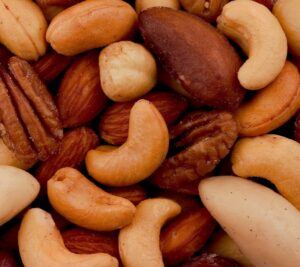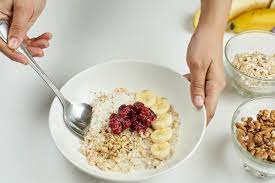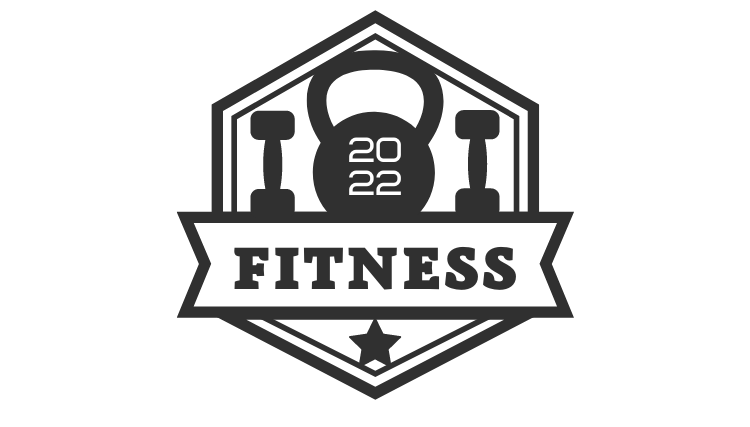Women’s weight reduction is influenced by several variables than diet and exercise.
In reality, sleep and stress affect hunger, metabolism, weight, and belly fat.
Fortunately, little changes to your daily routine can result in considerable weight loss.
Here are the Top 23 Female Weight Loss Tips
1. Reduce your intake of refined Carbohydrates
The processing of refined carbohydrates diminishes the amount of fibre and minerals in the final product.
These foods raise blood sugar levels, cause hunger, and increase body weight and belly fat.
So avoid processed carbs like white bread, spaghetti, and prepackaged meals.
Go for whole grains like oats and brown rice.
2. Include Resistance Training in Your Routine
Resistance exercise both builds muscle and improves endurance.
It is perfect for women over 50 since it boosts the number of calories your body burns during rest.
Also aids in the preservation of bone mineral density, which protects against osteoporosis.
Starting with weights, gym equipment, or bodyweight workouts is simple.
3. Drink More Water
Consuming more water is a simple and efficient strategy to assist in weight reduction with little effort.
After 30–40 minutes, consuming 16.9 ounces (500 ml) of water boosted calorie expenditure by 30%.
Having water before a meal may also help you lose weight and reduce calorie consumption by around 13%.
4. Increase your Protein Intake
Protein foods such as
- Meat
- Poultry

- Fish
- Eggs
- Dairy
- Legumes are essential components of a balanced diet, especially when it comes to weight loss.
In fact, eating a high-protein diet may lessen cravings, increase fullness, and speed up metabolism.
It also reduced daily calorie consumption by 441 calories, which resulted in an 11-pound weight loss over 12 weeks (5 kg).
5. Establish a Consistent Sleep Schedule
According to research, getting adequate sleep is just as crucial for reducing weight as food and exercise.
Sleep deprivation has been related to increased body weight and ghrelin levels, the hormone that triggers eating.
Getting seven hours of sleep every night and improving overall sleep quality increased weight loss chances by 33%.
6. Increase your Cardio Activity
Aerobic exercise, often known as cardio, raises your heart rate to burn more calories.
Exercising regularly can help you lose weight, especially when combined with a balanced diet.
Aim for at least 20–40 minutes of cardio each day, or roughly 150–300 minutes per week, for the best effects.
7. Keep a Food Journal
Keeping a food journal might help you stay accountable and make healthier choices.
It also makes calorie counting simple, which may help with weight reduction.
Increased dietary fibre slows stomach emptying and keeps you fuller longer, helping you lose weight.
8. Consume Fibre
Fibre slows stomach emptying and keeps you fuller for longer, helping you lose weight.
Dietary fibre lowered caloric intake by 10% and resulted in a 4.2 lb (1.9 kg) weight reduction in 3.8 months.
Fruits, vegetables, legumes, nuts, seeds, and whole grains are all good sources of fibre.
9. Practice Mindful Eating
Mindful eating entails reducing external distractions throughout your meal.
Try eating carefully and paying attention to how your meal tastes, looks, smells and feels.
This technique promotes healthy eating habits and is a robust tool for weight loss.
Eating slowly may boost feelings of fullness and reduce daily calorie intake.
Please leave comments and questions below if you linked to my post.
10. Snack Wisely
Choosing a healthy, low-calorie snack helps you lose weight and remain on track.
To enhance fullness and prevent cravings, choose foods substantial in protein and fibre.
Fruit with nut butter, vegetables with hummus, or Greek yogurt with almonds can help you lose weight.
11. Ditch the Diet
While fad diets often promise rapid weight loss, they may cause more harm than good to your waistline and health.
One research of college women found that avoiding particular meals boosted desires and overeating.
Fad diets can also encourage poor eating habits and yo-yo dieting, which are harmful to long-term weight reduction.
12. Increase the Number of Steps
You may burn more calories and reduce weight even if you don’t have time for a complete workout.
Non-exercise-related activity is thought to account for up to half of daily calorie expenditure.
Instead of taking the elevator, park farther away from the door and walk during your lunch break.
13. Establish Attainable Goals
Setting SMART goals will help you reach your weight loss goals.
SMART objectives should be precise, measurable, attainable, relevant, and time-bound.
They should keep you responsible and provide a strategy to help you achieve your goals.
Keep a food journal, go to the gym three times a week, and eat veggies in every meal.
14. Keep Stress Under Control
Some studies suggest that chronic stress may increase the chance of weight gain.
Stress can also cause changes in eating habits and lead to problems like bingeing and overeating.
These activities can help relieve tension.
15. Try HIIT
HIIT mixes vigorous activity with brief rest intervals to raise your heart rate.
Changing from exercise to HIIT a few times per week will help you lose weight faster.
HIIT burns more calories than conventional activities like biking, running, and weight training.
16. Use Smaller Plates
Using a smaller plate may help with portion control and weight loss.
One study found that those who ate less were pleased with a smaller serving.
Using a smaller plate will help you control portion size, reducing overeating and calorie intake.
17. Take a Probiotic Supplement
Probiotics are helpful microorganisms that may be eaten through food or supplements to assist gut health.
Studies have shown that probiotics can aid in weight reduction. It enhances fat excretion and lowers hunger hormones.
Lactobacillus Gasseri is a very efficient strain of probiotics.
It has been shown in studies to help reduce belly fat and total body weight.
18. Engage in Yoga
Yoga practice has been shown in studies to help prevent weight gain and enhance fat burning.
Yoga can also reduce stress and anxiety, both of which may be linked to emotional eating.
Yoga also reduces binge eating and food obsession, supporting healthy eating habits.
19. Chew Slower
Making an effort to chew thoroughly and slowly might help you lose weight by lowering your meal intake.
One study found that chewing 50 times each mouthful lowered calorie intake by more than 15 times every bite.
This reduced meal intake by 9.5% and 14.8%, respectively, according to another research.
20. Eat a Healthy Breakfast
A healthy breakfast can help you start your day off correctly and keep you full until your next meal.
In fact, maintaining a regular meal schedule may reduce the likelihood of binge eating. 
A high-protein breakfast has been proven to lower levels of the hunger promoting hormone ghrelin.
This can aid in controlling one’s appetite and hunger.
21. Experiment with Intermittent Fasting
Intermittent fasting involves eating and fasting for a period each day.
Fasting times range from 14–24 hours.
When it comes to losing weight, intermittent fasting is regarded as just as beneficial as calorie restriction.
It may also improve metabolism by boosting the number of calories expended during rest.
Limit the number of processed foods you eat.
Processed foods are high in calories, sugar, and salt but low in protein, fibre, and micronutrients.
More processed meals have been associated with increased body weight, especially in women.
As a result, it’s advisable to restrict your intake of processed meals and focus on complete foods like:
- Fruits
- Vegetables
- Healthy fats
- Lean Proteins
- Whole Grains, and Legumes.
Reduce your intake of added Sugars
Added sugar is a crucial factor in weight gain and serious health problems like diabetes and heart disease.
Sugary foods are abundant in calories but low in vitamins, minerals, fibre, and protein.
As a result, it’s ideal to limit your intake of sugary items like
- Soda
- Candy
- Fruit Juice
- Sports Drinks
and sweets to encourage weight reduction and maximize overall health.
The Bottom Line
Weight reduction is influenced by various factors, some of which go well beyond food and exercise.
Making a few easy lifestyle changes can help women lose weight and keep it off for good.
A daily regimen of even one or two of these strategies can assist optimize outcomes and promoting healthy weight reduction.
I hope you enjoyed my article, Please comments and questions below.


